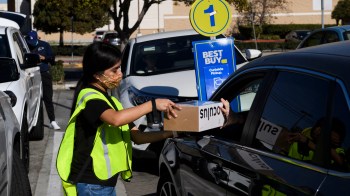
With Tupperware’s bankruptcy, where’s the party now?

The iconic food storage company Tupperware agreed this week to a sale of the business to a group of its lenders. The deal comes after Tupperware filed for Chapter 11 bankruptcy last month, following a couple of years in which the company’s revenue dropped precipitously.
The issues Tupperware is facing include anti-plastic sentiment and changes in how people shop. The brand was a pioneer in selling via party, a business model that’s also been used by companies that sell makeup, jewelry and clothing. Now, in an age of online sales, the party model has evolved — but Tupperware hasn’t evolved with it.
How Tupperware parties started
When Tupperware debuted its containers right after World War II, they were considered high tech, and buyers needed to see them in order to understand them. So the company found people to do the selling for them, right in someone’s living room. Homemakers would invite their friends over for a demonstration of Tupperware’s airtight storage. One seller was famous for filling a bowl with water — or even grape juice — sealing the lid with that distinctive burp, and then tossing it around the room.
Both the product and this method of sales were innovative at the time.
“It was an interesting new way of selling, and it was something that consumers responded well to,” said Neil Saunders, a retail analyst with GlobalData.
But this was a particular moment in time.
“The internet just changed all that,” Saunders said.
Tupperware is now available in Target stores and on its website, and on Amazon. But nearly 90% of the company’s sales last year came through direct sellers, the independent consultants that sell through personal connections and product demonstrations.
Product longevity hurts repeat sales
Tupperware has another challenge, Saunders said: “Tupperware does last. So once you’ve bought a set, you probably don’t need to buy another one for 10 years, maybe more.”
Compare that with skincare and makeup. When people are loyal to a product, they might refresh their supply regularly for decades.
“They’re consumable. You use them, you run out, you need to buy more,” Saunders said.
Tupperware did not respond to requests for an interview by deadline.
Tamie Jones of Wake Forest, North Carolina, said that shoppers can stay fiercely loyal to a product they believe in. She started holding Mary Kay parties more than 40 years ago and said some of her customers have been with her much of that time.
When Jones started selling, she was divorced and working as a dental assistant. It’s always been just part time for her, as a way to make some extra cash.
“I never made tons of money,” Jones said.
The benefits of direct selling
She said she usually earned $1,000 to $2,000 a year — sometimes more. There were other benefits: She liked bonding with other women. Also, she said taking charge at the parties increased her confidence.
“You’ve got to be able to get up there and talk, and people are looking at you and watching what you say. That’s intimidating,” said Jones. “But the more you do it, the easier it gets.”
Jones doesn’t host parties these days, and she sells to just a few friends and family members. Mary Kay said in a statement that the amount its “independent beauty consultants” make “can depend on many factors, including personal business goals, sales ability, time invested and business expenses.”
Babson College marketing professor Lauren Beitelspacher said the party plan business model works best for people who sell something because they love it.
“If you’re doing it as your livelihood to provide for your family, that could be problematic,” she said.
The problems with multilevel marketing
At least one company has faced legal action over problems sellers have faced. In 2021, the clothing company LuLaRoe settled a lawsuit for $4.75 million with the attorney general of Washington state. The lawsuit asserted that LuLaRoe, among other things, misled sellers by promising them big profits, when in reality, many were left with unsold merchandise and debt. As part of the settlement, LuLaRoe denied any wrongdoing.
Another practice that’s come under scrutiny? Most party plan companies encourage sellers to recruit others to sell. Then the recruiter will receive a percentage of the recruit’s sales from the company. This is called multilevel marketing.
Beitelspacher said in some communities, sellers are competing with their friends for the same customers.
“Then it becomes, ‘Well, I’ll buy this product from you, and you buy this product from me,’ and then nobody’s really making any money,” Beitelspacher said.
The Direct Selling Association (Mary Kay is a member, LuLaRoe is not, and Tupperware’s membership is pending), said in a statement that “there is never a lack of customers for anyone willing to give their time and energy to selling.” It also says direct sellers in the U.S. averaged just over $6,000 in sales last year.
Beitelspacher said a lot of those sellers have moved the party to social media.
“You just create an event … and because your friends have opted into this online event, the content that you post is going to show up in their feed,” she said.
A turn to social media
Beitelspacher said part of the allure is you can only buy this way if you’re invited.
“So, really appealing to our middle school senses of not wanting to get left out of the party,” she said. Tupperware acknowledged in a bankruptcy filing that it’s been “late to the party” when it comes to how people shop now. It said the technology that it’s providing to its sellers hasn’t been on par with what competitors use.
That’s one reason a lot of its sellers have quit — leaving the party entirely.
There’s a lot happening in the world. Through it all, Marketplace is here for you.
You rely on Marketplace to break down the world’s events and tell you how it affects you in a fact-based, approachable way. We rely on your financial support to keep making that possible.
Your donation today powers the independent journalism that you rely on. For just $5/month, you can help sustain Marketplace so we can keep reporting on the things that matter to you.

















